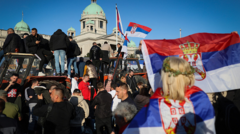Despite a monitoring organization estimating attendance at around 55,000—partly bolstered by supporters traveling from neighboring countries—this turnout was notably less than the immense anti-government protests that have rocked Serbia recently.
The unrest was largely triggered by a tragic incident in November, when a collapse at a Novi Sad railway station led to 15 fatalities, igniting public outrage directed towards what many perceive as corruption linked to Vucic's Progressive Party. Vucic framed this recent rally as the inception of a "Movement for the People and the State," aimed at safeguarding Serbia from those he claims are working to destabilize it.
During his speech, he called for a restoration of order and accused student-led protests of undermining national stability, suggesting that foreign intelligence forces were infiltrating the movements. Vucic's remarks were critical of the national broadcaster RTS, which he labeled as a key figure in an alleged plot for "colour revolution."
Following the disaster in Novi Sad, many citizens have pointed fingers at the ruling party's governance over the past decade. The tragic event was linked to the government's ambitious high-speed rail initiative—connecting Belgrade to Budapest—leading protesters to chant "corruption kills" as they voiced concerns over public safety and opaque government contracts benefitting a select few.
Protests have steadily intensified since last November, with recent estimates suggesting that last month's demonstration in Belgrade attracted upwards of 325,000 participants—potentially marking Serbia's largest protest in history. In stark contrast to Vucic's rally, this continued public outcry highlights the growing disenchantment with his administration following the tragic railway incident.
The Serbian government has faced further scrutiny, with allegations of using extreme measures such as 'sonic cannons' during protests. As calls for accountability grow, the political landscape in Serbia remains charged, with the potential for further demonstrations on the horizon.
The unrest was largely triggered by a tragic incident in November, when a collapse at a Novi Sad railway station led to 15 fatalities, igniting public outrage directed towards what many perceive as corruption linked to Vucic's Progressive Party. Vucic framed this recent rally as the inception of a "Movement for the People and the State," aimed at safeguarding Serbia from those he claims are working to destabilize it.
During his speech, he called for a restoration of order and accused student-led protests of undermining national stability, suggesting that foreign intelligence forces were infiltrating the movements. Vucic's remarks were critical of the national broadcaster RTS, which he labeled as a key figure in an alleged plot for "colour revolution."
Following the disaster in Novi Sad, many citizens have pointed fingers at the ruling party's governance over the past decade. The tragic event was linked to the government's ambitious high-speed rail initiative—connecting Belgrade to Budapest—leading protesters to chant "corruption kills" as they voiced concerns over public safety and opaque government contracts benefitting a select few.
Protests have steadily intensified since last November, with recent estimates suggesting that last month's demonstration in Belgrade attracted upwards of 325,000 participants—potentially marking Serbia's largest protest in history. In stark contrast to Vucic's rally, this continued public outcry highlights the growing disenchantment with his administration following the tragic railway incident.
The Serbian government has faced further scrutiny, with allegations of using extreme measures such as 'sonic cannons' during protests. As calls for accountability grow, the political landscape in Serbia remains charged, with the potential for further demonstrations on the horizon.



















